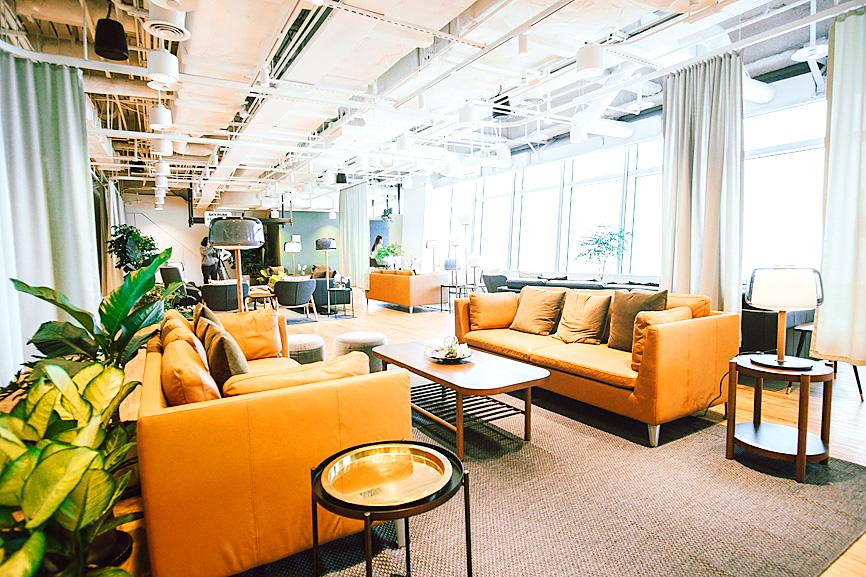Almost all office spaces in the iconic Taipei 101 skyscraper continue to be leased out despite disruptions to the global economy caused by the COVID-19 pandemic, the company that owns the building said.
While some tenants have moved out because of the pandemic’s economic effects, several others, including financial and technology firms, have moved in, Taipei Financial Center Corp (TFCC, 台北金融大樓) chief operating officer Michael Liu (劉家豪) said.
The building is about 96 percent occupied, he said.

Photo courtesy of Taipei Financial Center Corp via CNA
The high occupancy rate echoes observations of property analysts, who have said that premium office space in Taipei’s Xinyi District (信義), where Taipei 101 is located, remains in high demand, despite the pandemic.
Liu said that the Bureau Francais de Taipei, the French representative office in Taiwan, would soon move into the building, and four to five multinational financial institutions, fashion brands and high-tech companies could sign leases in the second quarter, which would bring the building near full occupancy.
To provide a better environment for the 13,000 employees of the building’s 120 tenants, Taipei 101 has created a shared space called Sky Park on the 35th floor, which aims to offer employees a space that supplements their home as well as their workplace, Liu said.
Phase 1 development of the 484 ping space (1,600m2) was completed early last year, and the second phase was finished at the beginning of this year, he said.
Sky Park offers space for work breaks and services such as restaurants, a convenience store, a pharmacy, and laundry and dental care services, Liu said, adding that a barber shop is planned.
The monthly rent for most spaces in Taipei 101 is from NT$3,500 to NT$4,500 per ping, while the rent on higher floors can be as high as NT$5,000 per ping.
Local media have reported that TFCC recently raised the rent in newly signed contracts, with rents 20 to 30 percent higher than before.

In Italy’s storied gold-making hubs, jewelers are reworking their designs to trim gold content as they race to blunt the effect of record prices and appeal to shoppers watching their budgets. Gold prices hit a record high on Thursday, surging near US$5,600 an ounce, more than double a year ago as geopolitical concerns and jitters over trade pushed investors toward the safe-haven asset. The rally is putting undue pressure on small artisans as they face mounting demands from customers, including international brands, to produce cheaper items, from signature pieces to wedding rings, according to interviews with four independent jewelers in Italy’s main

Japanese Prime Minister Sanae Takaichi has talked up the benefits of a weaker yen in a campaign speech, adopting a tone at odds with her finance ministry, which has refused to rule out any options to counter excessive foreign exchange volatility. Takaichi later softened her stance, saying she did not have a preference for the yen’s direction. “People say the weak yen is bad right now, but for export industries, it’s a major opportunity,” Takaichi said on Saturday at a rally for Liberal Democratic Party candidate Daishiro Yamagiwa in Kanagawa Prefecture ahead of a snap election on Sunday. “Whether it’s selling food or

CONCERNS: Tech companies investing in AI businesses that purchase their products have raised questions among investors that they are artificially propping up demand Nvidia Corp chief executive officer Jensen Huang (黃仁勳) on Saturday said that the company would be participating in OpenAI’s latest funding round, describing it as potentially “the largest investment we’ve ever made.” “We will invest a great deal of money,” Huang told reporters while visiting Taipei. “I believe in OpenAI. The work that they do is incredible. They’re one of the most consequential companies of our time.” Huang did not say exactly how much Nvidia might contribute, but described the investment as “huge.” “Let Sam announce how much he’s going to raise — it’s for him to decide,” Huang said, referring to OpenAI

The global server market is expected to grow 12.8 percent annually this year, with artificial intelligence (AI) servers projected to account for 16.5 percent, driven by continued investment in AI infrastructure by major cloud service providers (CSPs), market researcher TrendForce Corp (集邦科技) said yesterday. Global AI server shipments this year are expected to increase 28 percent year-on-year to more than 2.7 million units, driven by sustained demand from CSPs and government sovereign cloud projects, TrendForce analyst Frank Kung (龔明德) told the Taipei Times. Demand for GPU-based AI servers, including Nvidia Corp’s GB and Vera Rubin rack systems, is expected to remain high,